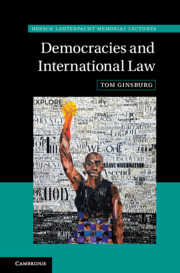Book contents
- Democracies and International Law
- Recent books in the Hersch Lauterpacht Memorial Lecture Series
- Democracies and International Law
- Copyright page
- Dedication
- Frontispiece
- Contents
- Figures
- Tables
- Preface
- Acknowledgments
- Introduction
- 1 Why Would Democracies Be Different?
- 2 Are Democracies Different?
- 3 Can International Law Save Democracy?
- 4 Regions and the Defense of Democracy
- 5 Authoritarian International Law
- 6 Whence the Liberal Order?
- Conclusion
- Index
6 - Whence the Liberal Order?
China, the United States and the Return of Sovereignty
Published online by Cambridge University Press: 09 September 2021
- Democracies and International Law
- Recent books in the Hersch Lauterpacht Memorial Lecture Series
- Democracies and International Law
- Copyright page
- Dedication
- Frontispiece
- Contents
- Figures
- Tables
- Preface
- Acknowledgments
- Introduction
- 1 Why Would Democracies Be Different?
- 2 Are Democracies Different?
- 3 Can International Law Save Democracy?
- 4 Regions and the Defense of Democracy
- 5 Authoritarian International Law
- 6 Whence the Liberal Order?
- Conclusion
- Index
Summary
Much of the future of the international order will depend on the interactions of China and the United States, the world's most important autocracy and democracy. Each of these countries has very different conceptions of international order and the place of law within it. Yet despite their very different approaches, both China and the United States share similar attitudes to international law. Both are essentially hegemonic in their approach, and this provides a space for the continuing presence of prodemocratic international law among smaller countries.
Keywords
- Type
- Chapter
- Information
- Democracies and International Law , pp. 237 - 287Publisher: Cambridge University PressPrint publication year: 2021

